 Petzlover
Petzlover Mal-Shi is originated from United States but Mucuchies is originated from Venezuela. Mal-Shi may grow 41 cm / 16 inches shorter than Mucuchies. Mal-Shi may weigh 54 kg / 119 pounds lesser than Mucuchies. Mal-Shi may live 3 years more than Mucuchies. Mal-Shi may have less litter size than Mucuchies. Mal-Shi requires Moderate Maintenance. But Mucuchies requires Low Maintenance
Mal-Shi is originated from United States but Mucuchies is originated from Venezuela. Mal-Shi may grow 41 cm / 16 inches shorter than Mucuchies. Mal-Shi may weigh 54 kg / 119 pounds lesser than Mucuchies. Mal-Shi may live 3 years more than Mucuchies. Mal-Shi may have less litter size than Mucuchies. Mal-Shi requires Moderate Maintenance. But Mucuchies requires Low Maintenance
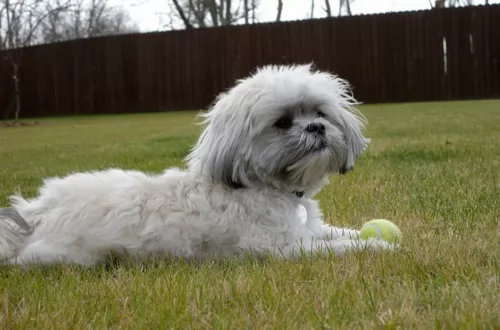 Small and pretty, the Mal-shi is a new crossbreed dog which originated in the United States and only recently - in the 1990s.
Small and pretty, the Mal-shi is a new crossbreed dog which originated in the United States and only recently - in the 1990s.
There hasn’t been much interest shown in developing this small dog into an independent breed, so most of these dogs are regarded as crosses from the two parent breeds – the Maltese Poodle and the ShihTzu.
Known as a designer dog he was also bred to be a low shedder. No breed clubs for this dog have been established and there are no breed standards either.
 The Mucuchies are a breed born in the Venezuelan mountains, in the late 1700s. They are rare today but were popular in the mountains for hundreds of years. They are believed to be a cross between the dogs brought by the Spanish Conquistadors in the 14th and 15th centuries and the local dogs. However, by the 1960s this rare breed was close to extinction.
The Mucuchies are a breed born in the Venezuelan mountains, in the late 1700s. They are rare today but were popular in the mountains for hundreds of years. They are believed to be a cross between the dogs brought by the Spanish Conquistadors in the 14th and 15th centuries and the local dogs. However, by the 1960s this rare breed was close to extinction.
Bred primarily as herders and watchdogs, their ancestry likely included the Algerian Mastiff, the Spanish Mastiff, the Great Pyrenees, and the Atlas Shepherd, otherwise known as the Aidi. The early development of the Mucuchies is attributed to Wilender Ferrari, DVM. At the time, Simon Boliva was fighting for Venezuelan independence in the city of Mucuchies. He adopted a member of the breed and named it for the city. The name stuck as the name for the breed.
Later in this timeframe, the Mucuchies was crossbred with the Pyrenean Mastiffs that friars brought to the Andes from their monasteries. With them, they also brought the sheep for the dogs to herd and guard. During the 1920s the breed spread throughout the country, but by the beginning of the 1960s there was a major decline in the breed. This was partly due to changes in culture and lifestyle in the Andes.
In 1961 a Mucuchies club was formed for the breed preservation and the breed was formally named the National Dog of Venezuela. The club was disbanded in the mid-1960’s and this led the breed to the edge of extinction. By 2008 there was another major push to save the breed. This effort came from the government who wanted to preserve the breed. In 2008, they created the Fundacion Nevado and sent six Mucuchies to the Waraira Repano Cable Car System in the El Avila National Park so that the dogs would be in a climatic environment as similar to the Andes mountain as possible. This was successful and the program was increased by Venezuelan President Hugo Chavez.
As the breed continued to develop the shepherding instincts were lost and the guarding aspects were strengthened. This left today’s Mucuchies as a breed of gentle, active dogs with strong characters and a loving disposition. They are gentle with their families but protective and aggressive with strangers. They are the only native breed of Venezuela and currently, there are programs in the mountains to re-establish and strengthen them.
In addition to their name for the town of Mucuchie, the breed is also called the Paramo’s Dog or the Snowy. These programs exist because in Venezuela they are near extinction once again. This is the result of inbreeding and more cross-breeding, this time with larger dogs like St. Bernards. Thus, the continued efforts by the Nevado Foundation with the assistance of the government to restore the original Mucuchies breed to Venezuela.
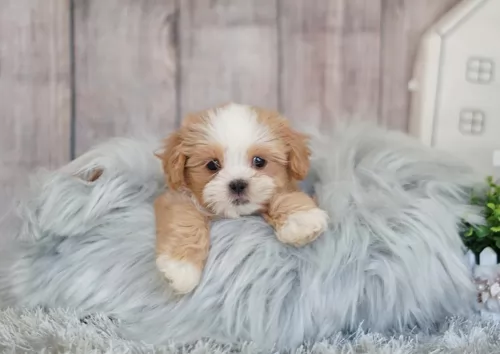 The Mal-Shi is a small dog standing at around 25–30 cm in height and weighing between 3 and 7kg. As a designer dog he has a low-shedding coat of many colors – white, black and white, white and apricot and brown.
The Mal-Shi is a small dog standing at around 25–30 cm in height and weighing between 3 and 7kg. As a designer dog he has a low-shedding coat of many colors – white, black and white, white and apricot and brown.
The coat is usually soft and silky and slightly wavy and it can grow long if left untrimmed. Most people take their pets to a professional groomer to be cut.
The skull of the dog is domed, he has small ears which can be half-erect and half-floppy.The tail is long and fairly feathery. Sometimes the dog inherits the underdeveloped tear duct of the Maltese and then there is that usual tear-staining around the eyes.
THE Mal-Si is such a cute little dog, making him a splendid pet for children and he is more than happy to be cuddled and petted. Small and active, he is adaptable and will live easily in the city or the countryside, as his exercise needs aren’t that demanding. He basically requires a walk each day and will love some ball games both inside and outdoors.
He is an extrovert and also an entertainer, and his amicable nature allows him to get along with other pets in the home. However, contrary to what he looks like, he is a bold dog, social and also intelligent, making him easy to train.
It is to any owner’s advantage to have a little dog like this trained and socialized, even though he is so good natured. He makes a great therapy dog too. When the Mal-Shi is at home he’s an affectionate, loving dog who just wants to spend time in the company of his human family.
As a companion dog, he won’t do well when left for hours on end on his own. Dogs are social creatures, and they can battle with separation anxiety when left alone for too long. Every dog owner needs to think of this before investing in a dog.
 The appearance of the Mucuchies is that of a breed of large dogs who stand two feet at the shoulder and can weight one hundred pounds. They have a deep chest, heads that are wedge-shaped and skulls shaped like domes. Their muzzles are straight, and their nostrils are large on their black nose. The Mucuchies have dark eye and eyelids along with ears that are triangular in shape and medium in size. Their lips are black but this and he has a well-developed ruff.
The appearance of the Mucuchies is that of a breed of large dogs who stand two feet at the shoulder and can weight one hundred pounds. They have a deep chest, heads that are wedge-shaped and skulls shaped like domes. Their muzzles are straight, and their nostrils are large on their black nose. The Mucuchies have dark eye and eyelids along with ears that are triangular in shape and medium in size. Their lips are black but this and he has a well-developed ruff.
They are large, sturdy dogs with a grand appearance and tremendous energy. Their neck is strong, short and very muscular with wide shoulders and a straight back. The tail is much longer than their hocks and it is shaped like a fan and he raises it when he is alerted. They have a short, thick coat and most are white or white with gray, honey or black. This is a very attractive breed.
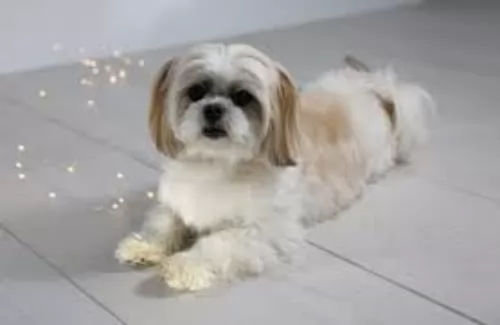 The Maltese Shih Tzu is an attractive little dog who is guaranteed to make you a splendid pet. Those who have owned both Maltese and Maltese Shih Tzu will tell you that the temperament of this dog is more amicable than that of the Maltese.
The Maltese Shih Tzu is an attractive little dog who is guaranteed to make you a splendid pet. Those who have owned both Maltese and Maltese Shih Tzu will tell you that the temperament of this dog is more amicable than that of the Maltese.
With his amicable nature, he is willing to be everyone’s friend, and he makes a particularly good choice for elderly people.
Being such a people-dog, the Maltese Shih Tzu's greatest joy comes from being petted and taken notice of by his human family. He can’t bear to be left for long periods of time. Like any other dog, he will require training and socialization, requiring a firm, balanced, consistent, fair owner.
Cheerful and good-natured, when he is loved to the moon and back, this little dog promises to make you and exceptional best friend.
 Good with children and very good with their own families. Might be a little standoffish with others.
Good with children and very good with their own families. Might be a little standoffish with others.
They no longer have the strong herding instinct but are outstanding guard dogs.
Yes but need land to run in. Don’t put this giant dog in an apartment. You will both be miserable.
Very intelligent and their ability and willingness to learn is very good.
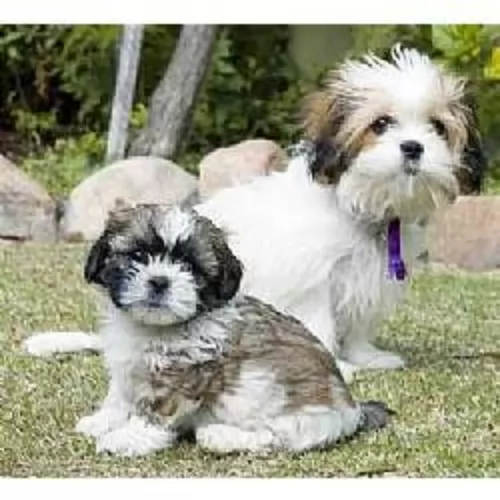 The Maltese Shih Tzu is a robust little dog, and with good care he can live to be anything between 10 to 15 years of age.
The Maltese Shih Tzu is a robust little dog, and with good care he can live to be anything between 10 to 15 years of age.
There are some health issues you want to be aware of with this particular dog breed.
Your little canine friend can have respiratory problems because of him being a flat-faced breed. Known as brachycephalic dogs, these dogs can have breathing difficulties. They are usually fine when resting, but during exercise or if they become too hot, they battle with breathing. It makes them more prone to heatstroke, so it is important to keep dogs like this cool and calm.
This is actually a common problem in small dogs - dislocation of a bone at a joint. Patellar luxation is when the knee joint slides in and out of place, causing pain.
This is a disease which is seen in the Shih Tzu and Maltese. Symptoms include uncontrollable shaking and tremors. These can continue all day. The illness is worse during times of stress and there may even be difficulty with walking. The cause is unknown but he will certainly need to get to the vet.
 Because of their rarity and somewhat isolation, they do not have many genetic health concerns. They do however face at least a couple of the issues that most large dogs face.
Because of their rarity and somewhat isolation, they do not have many genetic health concerns. They do however face at least a couple of the issues that most large dogs face.
This can be a serious issue for such a large dog. It can cause arthritis and lameness.
This might be the biggest threat to the Mucuchies’ health. They are big dogs and if they injury limbs it can be quite serious.
The distension or inversion of the stomach and intestines is potentially fatal and must be treated immediately. Large dogs are prone to bloat and feeding schedules can go a long way in preventing it.
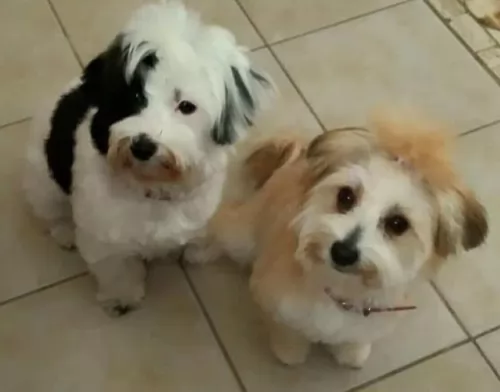 The Mal-Shi is a small dog and will require eating two small meals a day. An adult Mal-Shi will eat according to his age, size and activity levels.The quality of the dog food you buy will make a huge difference to his wellbeing. The better quality foods – those without preservatives, colorants and fillers will ensure good health and longevity for your pet.
The Mal-Shi is a small dog and will require eating two small meals a day. An adult Mal-Shi will eat according to his age, size and activity levels.The quality of the dog food you buy will make a huge difference to his wellbeing. The better quality foods – those without preservatives, colorants and fillers will ensure good health and longevity for your pet.
Don’t just give him dry kibble every time – mix in some chopped up cooked chicken, brown rice and vegetables. Remember that some vegetables like onion can be bad for your pet.
Dogs love simplicity, and feeding your dog these simple foods will ensure you don’t battle with upset stomachs. Make sure you always have a bowl of fresh, cool water available for your pet.
Trim his nails when they get long and don’t wear down naturally.
Check his ears for redness, itchiness and discharge which could indicate an ear infection.
If you have him professionally groomed, you will still need to brush him twice a week. It’s also your time to check him over for ticks and fleas and any unusual lumps.
 As mentioned in health concerns, feeding appropriately is critical to the Mucuchies’ health. Puppies need a high quality, large breed dry food 2-3 times per day at ½ cup each time. Don’t overfeed. Don’t exercise before or after eating to prevent bloat.
As mentioned in health concerns, feeding appropriately is critical to the Mucuchies’ health. Puppies need a high quality, large breed dry food 2-3 times per day at ½ cup each time. Don’t overfeed. Don’t exercise before or after eating to prevent bloat.
The adult Mucuchies should eat at least twice a day for a total of two and one-half cups. So, you might feed one and ¼ cup at each meal. Again, it is critically important that you don’t overfeed. Don’t feed before or after strenuous exercise and don’t let your Mucuchies eat too quickly in order to avoid bloat.
This is a large dog with generally very good health. His stamina and heart will impress you.
The Mucuchies is not an active inside dog, but he is a large dog that needs daily exercise. They need to be able to run or at least to trot. A large yard or dog bark is necessary. However, this big, double coated dog hates the hot weather and needs a cooler climate. Winter is fine with him. Don’t overwork them while they are growing. Walks are the best exercise for this breed.